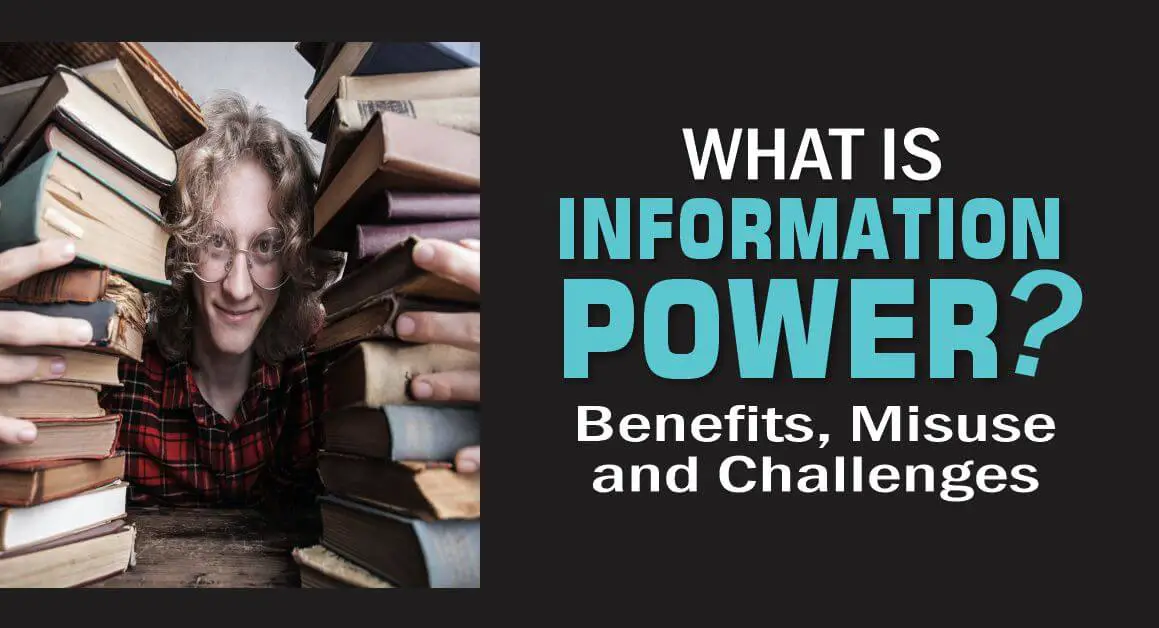Leverage information power and mastery for success through gathering, analyzing, and utilizing data to gain a competitive edge in today’s information-driven world.
As one of the social powers, information power has taken center stage in shaping today’s society by influencing opinions, driving innovation, and transforming communication dynamics.
If you are bereft of information, you are likened to the caveman whose only priority is to hunt and satiate his appetite.
The world has advanced so much that information is a powerful tool to drive and engineer society.
Understanding its mechanics is key to unlocking a world of benefits, from informed decision-making to strategic advantage.
On the flip side, this power comes with risks and misuse which can lead to misinformation, privacy breaches, and ethical mishaps.
Navigating the challenges of data overload, and security threats, and maintaining integrity is important to enjoy the benefits therein.
In this article, you will learn the dynamics of information power, and how to harness its potential while mitigating its pitfalls.
What is Information Power?

Information power refers to the ability to access, analyze, and utilize information effectively.
It’s the power to seek facts, data, opinions, and insights, and use them to make informed decisions.
You probably have a guy in your circle who seems to know a lot of things – from the happenings in the world to identifying most animals you never heard of, and understanding how international relations work and even the physics of the universe.
You might even be that guy.
Such people have a kind of respect accorded them for their in-depth knowledge of things others struggle to know or understand.
Imagine a scenario where a company utilizes information power by implementing scenario-based learning in its training programs.\
Employees engage in immersive simulations, making decisions in a risk-free environment that mirrors real-world challenges.
Through this experiential learning, they enhance problem-solving skills, critical thinking, and interpersonal abilities.
This not only boosts employee engagement and skill acquisition but also sustains a culture of continuous learning and adaptation, showcasing the undeniable impact of information power in a corporate setting.
Related: Power Dynamics: Understanding the Complexities of Interpersonal Relationships
How does Information Power Differ from Other Types of Power?
Unlike other forms of power, the power of information does not require formal authority, personal relationships, or special skills, but instead relies on the ability to control information.
Understanding the differences between types of power can help you and entities use your power more effectively and appropriately, maximizing your potential to achieve your goals.
Here is how information power differs from others:
Information Power vs Referent Power
Referent power comes from being admired and respected by others.
It’s based on charisma, personality, and the ability to connect with people while the power of information is based on access to information.
See a dedicated post on everything about referent power.
Information Power vs Expert Power
Information power differs from expert power in that it is not solely based on your knowledge and skills, but rather on your ability to access, analyze, and leverage data and information to influence decisions and outcomes.
Expert power is limited to your personal expertise, while information power extends beyond that to cover the strategic use of data.
See a dedicated post on the power of expertise.
Information Power vs Coercive Power
Information power is based on controlling and leveraging information to influence decisions positively, while coercive power relies on fear, threats, and punishment to force compliance, often leading to resentment and dissatisfaction.
See a comprehensive post on the power of coercion.
Information Power vs Reward Power
As has been explained above, information power is the ability to control and leverage data and insights to influence decisions, while reward power relies on providing benefits or incentives to gain compliance.
The power of information is more strategic and lasting compared to the temporary compliance achieved through reward power.
See a comprehensive post on the power of reward.
Also Read: Why Democratic Leadership Style Is Key To Team Empowerment
Related: Fear Propaganda: How It is Used For Psychological Manipulations
Why is Information Power Important?

Information might be at the fingertips of everyone, but not everyone values and accesses the abundance of information this new age has to offer.
You can imagine how people are too lazy to look up information past the first page of Google, and too mentally inept to compare the results from two sources of information.
A person who can do that is invaluable and indispensable in society.
Here is the importance of wielding the almighty power of information.
1. Education
Information power educates, raises awareness, and fuels social justice movements.
Without information power in this new age, you can’t access information with, learn a skill without going to class and even earn money in the comfort of your bedroom.
2. Informed Decisions
Informed decisions are important outcomes of power of information, enabling you and organizations to make choices based on accurate, reliable data, leading to better outcomes and strategic advantages.
3. Problem-solving
Problem-solving, a key aspect of information power, enables you and organizations to address challenges effectively, make informed decisions, and drive innovation, improving success and growth.
4. Empowering Others
The power of information can be used to empower others. By sharing knowledge and providing access to important information, individuals can give others the tools they need to succeed.
This is particularly important in developing countries, where access to education and information can be limited.
By using their informational power to empower others, individuals can help create a more equitable and just society.
5. Empowerment in Personal and Professional Lives
I can’t remember how many times I have searched for information online.
Whatever thing I need information on, I instinctively go online to search for it, and I am not always disappointed.
Sometimes, I even unconsciously want to search for my thoughts online. Funny right?
Informational power can give you an advantage in your personal and professional life.
For example, a job seeker who has access to the latest industry trends and developments is more likely to be hired than someone who is not up-to-date on the latest information.
Similarly, a student who has access to a wide range of academic resources is more likely to excel academically than someone who relies on outdated textbooks.
In short, this power can help individuals make informed decisions, stay ahead of the curve, and succeed in their chosen fields.
6. Impact Businesses Positively
It can impact businesses in numerous ways.
A company that has access to market trends and consumer data can make better-informed decisions about product development, marketing, and sales.
Similarly, businesses that monitor their competitors’ activities can identify potential threats and opportunities in the marketplace.
In today’s fast-paced business environment, this power can give companies a significant competitive advantage over their rivals.
Also Read: Developing Positional Power For Organizational Impact
What are the Sources of Information Power?
The most valuable source of power in our modern world derives from information.
Without information, the world would be stabbing around in the dark and stumbling all the way.
Here are how are the sources of the power of information:
1. Knowledge and Expertise
People with deep expertise and knowledge in a particular field can wield a considerable amount of information power.
They can provide authoritative opinions and insights, anticipate trends and analyze complex data, and lead others in critical decision-making processes.
Their expertise commands respect and inspires trust, which can be used to influence others.
They can inspire others to act, mobilize resources, and amplify their messages to a wider audience.
2. Access to Information
Access to a diverse range of information sources can provide significant power.
People who can get access to cutting-edge research, real-time data, and exclusive intelligence have an advantage in making decisions and developing strategies.
They can identify emerging trends, uncover hidden opportunities, and mitigate risks before they become significant threats.
3. Social Networks and Relationships
Another source of the power of information is networks and relationships. Those who have strong networks or relationships with others can use them to access valuable information.
This could be through professional networks, social networks, or personal relationships.
For example, a journalist who has a wide network of sources can use it to access information that others can’t.
4. Media
Media outlets are another powerful source of information. They can help shape public opinions, influence perceptions, and shape narratives.
People who have a presence in the media, such as politicians, celebrities, or industry leaders, can leverage their celebrity status to access wider audiences and get their messages across more effectively.
5. Technology
Technology is another significant source of information power. People who can leverage technology to collect, process, and analyze data can gain a competitive advantage.
They can turn raw data into actionable insights, automate workflows, and innovate new products or services.
6. Position and Authority
Position and authority are also sources of information power.
Those who hold positions of authority, such as managers or executives, have access to information that others don’t have.
They can use this information to make decisions and to influence others.
For example, a CEO who has access to financial information can use it to make informed decisions about the company’s future.
7. Academic and Research Institutions
Academic and research institutions play a critical role in generating and disseminating knowledge and thus serve as significant sources of information power.
As centers of learning and inquiry, institutions of higher education, research centers, and think tanks produce high-quality academic research, scholarly publications, and specialized reports.
These institutions are staffed with experts in their respective fields, who possess a wealth of knowledge, skills, and expertise.
Through collaboration and exchange of ideas, academics and researchers contribute to expanding the frontiers of knowledge.
They develop new insights that can be utilized by decision-makers and other stakeholders.
Academic and research institutions also serve as hubs for information sharing.
They provide access to extensive collections of books, journals, academic articles, and other publications.
They offer online databases, online courses, and webinars that provide up-to-date information required by researchers and policy-makers, thus putting them at the forefront of information resources.
Advantages of Information Power

The advantages of the power of information are numerous and significantly impact various areas of our lives.
Here are some of the advantages:
- Makes Decision-making Easier: Access to accurate data empowers informed decisions. Businesses leveraging market and customer insights make strategic choices about resources, products, and marketing.
- Increases Knowledge and Skills: Information power enhances knowledge and skills, facilitating learning and personal growth.
- Improves Relationships: The power of information improves communication and builds relationships by sustaining understanding and shared experiences.
- Boosts Creativity: Information fuels creative thinking by inspiring new ideas and perspectives. It catalyzes innovation, enabling you to explore diverse concepts and generate fresh, creative solutions to various challenges.
- Enhances Productivity: Access to information improves productivity by enabling smarter work practices. Leveraging relevant information and technology allows you and organizations to achieve better results efficiently, optimizing resource utilization and overall performance.
What are the Potential Risks Associated with Information Power?
As has been described in this article, the power of information is a powerful tool that can be used to gain an advantage, but it can also be misused.
It is easier to misuse the power of information because of its high value and demand.
Here are ways information power can be misused by people who wield it:
1. Spreading False Information
Misuse of information often occurs through the spread of false information or fake news, especially in the age of social media.
This can lead to confusion, mistrust, and significant impacts in political contexts.
2. Data Breaches
Data breaches involve hackers accessing sensitive information for malicious purposes like identity theft or fraud, causing significant financial and reputational harm to individuals and organizations.
3. Cyberbullying
The power of information can also be misused for cyberbullying. When individuals use the internet or social media to harass, intimidate, or humiliate others, it can have serious emotional and psychological consequences.
Cyberbullying can lead to anxiety, depression, and even suicide in extreme cases.
4. Manipulation
Informational power in authoritarian regimes manipulates individuals by controlling access to information. Government-controlled media and censorship enable manipulation of public opinion and suppression of dissent, posing significant dangers.
4. Manipulation of the Truth to Serve Personal Goals
Misusing information undermines ethical standards, erodes trust, and can lead to severe consequences like reputation damage or legal repercussions.
Challenges of Information Power
The power of information is both a blessing and a curse. While it has opened up countless opportunities for us, it also presents many challenges that we must navigate.
Let’s take a look at some of the challenges:
1. Fake News
One of the biggest challenges when it comes to information power is the rise of fake news.
With social media, it’s incredibly easy for anyone to share an article or post without verifying its authenticity.
This has led to a flood of misinformation and propaganda being spread across the internet, leading people to make decisions based on false information.
2. Information Overload
Another challenge is the sheer amount of information that is available.
With so much data at our fingertips, it can be hard to sort through it all and determine what is important and what is not.
This can lead to decision fatigue and a feeling of being overwhelmed.
3. Privacy Concerns
As we share more and more information online, the issue of privacy becomes more and more important.
We are constantly being tracked and monitored, and our personal information is often used for nefarious purposes.
It can be difficult to know who to trust with our sensitive information and how to protect ourselves from online threats.
4. Access Inequality
Even though information is more widely available than ever before, there are still many who do not have equal access to it.
This can be due to economic or social reasons, and it can lead to a growing divide between those who have access to knowledge and those who do not.
5. Digital Divide
The digital divide is another challenge to information power. As technology advances at a rapid pace, some are left behind.
This can be due to a lack of infrastructure or resources, and it can lead to a growing divide between those who have access to technology and those who do not.
How Can I Leverage Information Power for Success?
It’s important to use informational power the right way to ensure we’re making informed decisions, and not falling prey to misinformation or propaganda.
Here are some key tips on how to use it the right way:
1. Fact-checking
The first step in using the power of information the right way is to fact-check the information you receive.
With so much fake news circulating on the internet, it’s important to verify the authenticity of the information you come across.
Use trusted and reliable sources to fact-check and cross-check the information you receive to ensure that it is indeed true and unbiased.
2. Seek Different Perspectives
One of the best ways to use the power of information the right way is to seek different perspectives.
Avoid relying on a single source for information and instead, look for diverse perspectives.
This allows you to gather a range of opinions and viewpoints, which can help you form a well-rounded and informed opinion.
3. Check your Biases
We all have biases, whether conscious or unconscious. It’s important to be aware of them and check them when consuming information.
This means being honest with yourself about your pre-existing beliefs and values and challenging them when necessary.
Being open-minded and willing to consider different viewpoints is crucial in using the power of information the right way.
4. Share Responsibly
In the age of social media, we have an unprecedented ability to share information with others.
However, it’s important to do so responsibly. Before sharing any information, ask yourself if it’s true, unbiased, and relevant.
Avoid sharing sensational or clickbait headlines, which are often misleading or inflammatory.
5. Stay Informed and Educated
Finally, the best way to use this powerful power the right way is to stay informed and educated.
This means keeping up with current events, reading reputable news sources, and educating yourself on relevant topics.
The more informed you are, the better equipped you’ll be to use the powerful tool of information the right way.
Difference between Information Power and Information Technology
Information power and information technology are two distinct concepts that are often confused with each other.
While both are related to information, they are different in their nature and scope.
Information power refers to the power or advantage that someone has by possessing or controlling information.
It is the ability to use information to make informed decisions, gain an advantage over others, or influence others.
For example, a company that has access to market data can use it to develop more effective marketing strategies or to gain a competitive advantage over its rivals.
On the other hand, information technology (IT) refers to the tools, processes, and systems used to manage and process information.
It includes hardware, software, networks, and databases that are used to store, retrieve, and transmit information.
For example, a company might use IT systems to collect and analyze customer data or to manage its supply chain.
In simple terms, information power is about the advantage that comes from possessing or controlling information, while information technology is about the tools and systems used to manage and process information.
Conclusion
Information power has become an essential tool for success in today’s fast-paced and data-driven world. The ability to gather, analyze, and utilize information effectively can give individuals and organizations a significant competitive advantage.
It can help them make informed decisions, identify new opportunities, and stay ahead of industry trends.
However, with this power comes great responsibility.
It’s crucial to ensure that the use of information power is ethical and responsible to avoid negative consequences such as spreading false information, discrimination, or cyberbullying.
By embracing the value of the great power of information and implementing tips and tricks for leveraging it, individuals and organizations can enhance their ability to succeed in various areas, including business, education, healthcare, and more.
References
- French and raven’s five forms of power: – Understanding where power comes from in the workplace. (n.d.). MindTools. https://www.mindtools.com/pages/article/newLDR_56.htm
- Bertram H. Raven (1926-2020). (2020, March 2). UCLA Department of Psychology. https://www.psych.ucla.edu/news/bertram-h-raven-1926-2020/
- Security Clearances. (n.d.). U.S. Department of State. https://www.state.gov/security-clearances
- Raven, B. H. (1992). A Power/Interaction Model of Interpersonal Influence: French and Raven Thirty Years Later. Journal of Social Behavior and Personality, 7(2), 217-244.
- French, J. R. P., Jr., & Raven, B. (1959). The bases of social power. In D. Cartwright (Ed.), Studies in social power (pp. 150–167). Univer. Michigan.
Pyo Merez (PsyD) is a distinguished adolescent and adult psychologist at the forefront of mental health advocacy.
With expertise in cognitive and developmental psychology, focusing on social relationships, cultural contexts, and individual differences, Pyo has dedicated his career to empowering adolescents and adults.
As a sought-after speaker and panelist, Pyo shares invaluable insights on issues affecting young people, contributing to a deeper understanding of mental health and well-being in today's society.


Hi,
I intend to contribute a guest post to your website that will help you get good traffic as well as interest your readers.
Shall I send you the topics then?
Best,
Claire Wilson
Thank you for reaching out to us Claire Wilson, please write me on this email, piousclements@gmail.com
Hi Nataly Komova. I will write you via email. Thank you for reaching out.